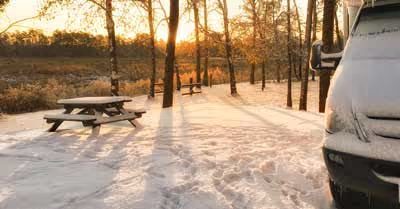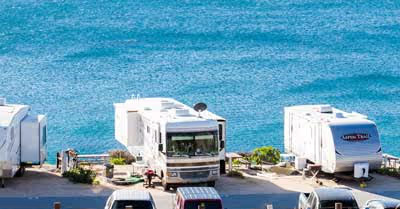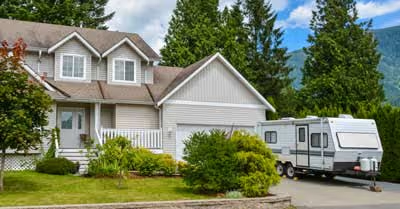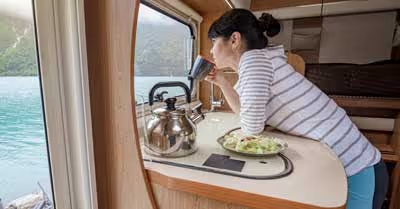Table of Contents
How Often Do RVs Break Down?
As I mentioned previously in the intro, RVs break down more often than you might expect them to be. However, you should also keep in mind that the level of frequency of these break downs also depends on how often you use your RV, the level of attention you give, and how often you send your RV for maintenance. All of these factors greatly affect how often your RV breaks down in the future but don't worry as I've already provided some ways that you can use to reduce the potential of these breakdowns in the section below but first, let's take a look at how these RVs break down in the first place.
How Do RVs Such as a Motorhome Break Down?
Firstly, you have to understand that an RV is just a huge heavy vehicle that has an engine and a drive-train combined with all of the essential parts of a vehicle. Every single part and vehicle in this world will eventually wear out and break down. This means that you will encounter all of the problems that you had before with your car, trucks, or motorcycle with your RVs.
For instance, you will need to buy new brake pads and windshield wipers for your RVs from time to time. Just in case you took care of your RVs really well and you get to keep it for some time, at a certain point in life, you will eventually need to deal with some of the bigger problems that most RVs owners have, which include suspension degradation and transmission issues.
On top of that, most RVs also have plumbing components and appliances that can potentially break down. The cause of these breakdowns may be due to the extreme weather conditions and your travel duration. Consequently, any RV appliances tend to break down a lot more often compared to a camper or home appliances. Even though these appliances might be small in size, they tend to be more expensive than you would expect.
This is because these appliances are known to run off propane and electricity, which explains why they cost more money to be manufactured. Apart from that, an RV such as the motorhome is also vulnerable to leaks. This is true, especially the Class C motorhome that is made from woods.
How Do I Prevent My RV From Breaking Down?
It's always easier for you to prevent your RV from breaking down compared to fixing it when it breaks down, so it's highly recommended for you to follow each of these steps correctly to prevent any future breakdowns. There are some things that you could do to achieve this. One of the most effective things you could do to prevent your RV from breaking down is purchasing the right RV according to your needs.
What I meant by this is that you should buy an RV that could handle all the load that you plan to place on it. For instance, you shouldn't buy an RV that is not meant to be used for off-roading when you're planning to have a lot of off-roading for your next trip. An off-road camper has appliances that are designed for handling the pressures of extreme road conditions, plus it also has a better suspension system than that of a standard camper.
Next, in a case where you already own an RV, then the first thing you always need to do is inspect the roof seams and seals of your RV. It's highly recommended for you to inspect the roof of your RV once every three months. Any open seams may cause water leaks in your vents, roof edges, air-conditioning unit, or skylights.
Then, you should also do your best to make sure that you increase the tightness of the wheel lug nuts as well as checking the pressures of your tires right before every trip. Check your RV wheel lug nuts to make sure that they have not loosened up while in storage or during your previous RV travel. Driving an RV with loose lug nuts is extremely dangerous as it can cause you to lose your wheel during your trip, so it is indeed a matter of life and death.
Other things that you can do include:
- Check the engine compartment of your RV
- Bend down and take a look if you spot any leaks
- Check your turn signals as well as the low and high beam lights
- Make sure your tires are not low in pressure
- Check your wheel to see if it leans
- Make sure your lug nuts are not rusty
- If you're pulling a trailer, be sure to check the coupler
Where are the Places to Repair My RV?
Most RVs, regardless of their class, can be conveniently repaired at your nearest standard vehicle mechanic. This is true especially for smaller Class B campers that would usually be built on a truck platform. A professional mechanic should take care of the mechanical problems related to your particular RV, but they can't, however, fix the interior problems linked to the caper portion of your RV.
On the other hand, an RV dealer would most likely be able to help you to fix the mechanical problems of your RV as well as the interior camper problems like plumbing issues or faulty appliances. As for the owners of the RVs with towable campers, you might probably want to visit a trailer repair company to fix the issues that your RV might have.
The reason for this is that they will be able to help you service the exterior components of your RV, like the axles and tires. However, please keep in mind that they also have their repair limits as they wouldn't be able to help you to fix interior problems like plumbing and appliances. Hence, the best repair method, in my personal opinion, is by manually doing it yourself.
The reason for this is that if you choose to do it yourself instead of relying on others to repair your RV, you will most likely be able to save up a lot of money on repairs. For instance, faulty appliances in your RV can be easily replaced with new ones, and any types of leaks can usually be solved by using a little bit of caulk. Most DIY RV repairs can help you to save a lot of time and money while you will also learn a lot of handy skills along the way.
What is the Total Cost of Repairing an RV?
If you choose to rely on other mechanics to help you repair your RV, then the average total cost of repairing an RV would vary as it depends on the things that are faulty in your RV, the person that chooses to fix your RV, as well as the location in which the repairs take place. For instance, order for you to get your engine that has blown out in the middle of nowhere in a desert replaced with a new one would most probably cost more money compared to repairing the faucet of a leaky kitchen in your RV.
Examples of Things to Repair with Actual Costs
A Brand New Transmission
The total costs of replacing your old transmission with a new one, even for the Class C motorhome that is built on an E-350 engine, will cost you around $2,000 in total. However, you will need to keep in mind the fact that this cost accounts only for the replacement of the transmission itself, and it does not include any labor fee, so you will need to have a couple of hundred dollars more to cover the whole costs of repairs.
A New Axle
One axle trailer kit with 3500 pounds of capacity will most likely cost you approximately $499, assuming that you are able to fix the axle manually by yourself, which is a task that not any regular Joe could do if you can't then expect it to be slightly higher than this.
A New Refrigerator
A replacement for an Isotherm Cruise refrigerator will most likely cost you around $650, and again please be reminded that this does not cover the installation fee. The size of this type of fridge is perfect for replacing an old broken fridge in a tiny motorhome or camper.
Fiberglass Holes and Scrapes
One can of 3M body filler usually can be sold at a retail price of $21.99. You may use this to fix the tiny holes and scrapes that you might find on the side of a fiberglass camper. Any person that has a high confidence level in their DIY skill will most likely be able to save a lot of extra money during the process. However, if you send it to an auto body shop to get even a simple job like this to be done, you will most likely be charged more than $70.
New Set of Tires
A single tire that can be used for a class A motorhome would usually cost you somewhere more than $300. Just in case you would like to replace your old tires with the new ones then, you will need to replace them in pairs. The reason for this is that replacing a new tire matched with an old tire will often cause some performance issues that you might want to avoid.
Typical Examples of RV Breakdowns
Broken Water Pumps
Broken water pumps or burst water lines can be considered to be a typical problem that most RV owners had to face. You may overcome this type of problem by keeping your RV the right way, especially during the cold season. As mentioned earlier in the article, you should also empty the water in your tank from time to time to prevent the water inside from freezing.
Punctured Tires
One problem that you will most likely have to deal with when you're putting too much weight in your RV is a punctured tire. Keep in mind that your RV can't always handle everything that you decide to put on it. This is true, especially when you're driving on poorly-maintained roads that would usually have a lot of bumps on them. The blowout of these tires is extremely dangerous due to the huge size of your RV and its heavy loads.
Carbon Monoxide
Carbon Monoxide is a lethal gas that can poison you and your loved ones, and while not many people die from this gas, carbon monoxide poisoning happened enough times that it's worth it to include it here in this article. RVs produce carbon monoxide just like cars do, except that RVs have a lot of openings that can potentially allow carbon monoxide to pass through. This thing shouldn't happen with normal RVs, so it's highly recommended for you to set some carbon monoxide detectors just to be safe.
Recent Articles














